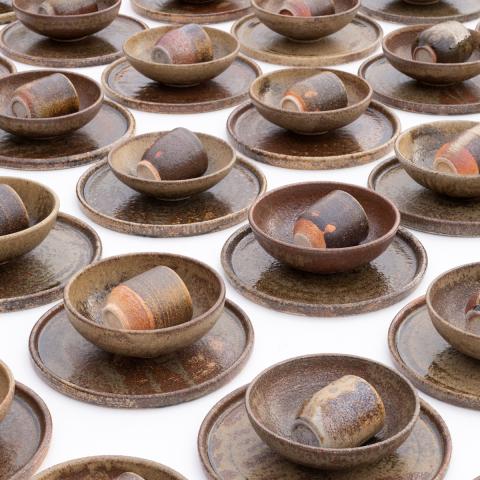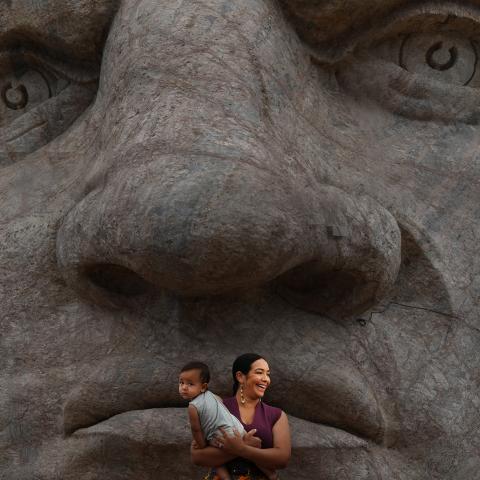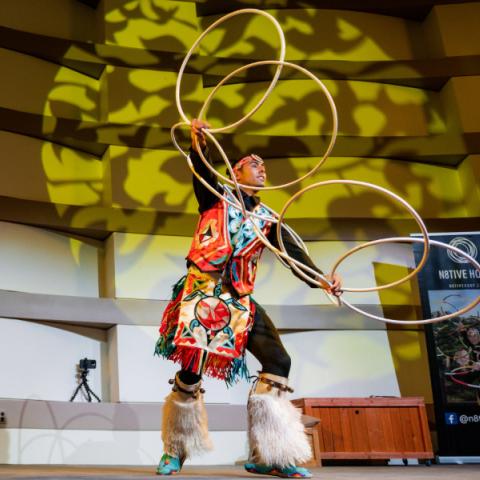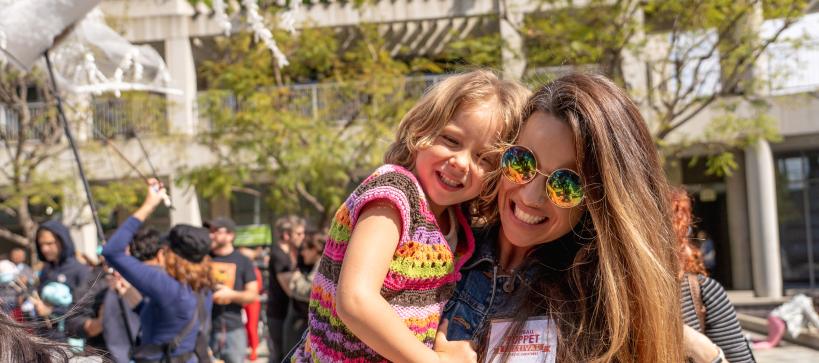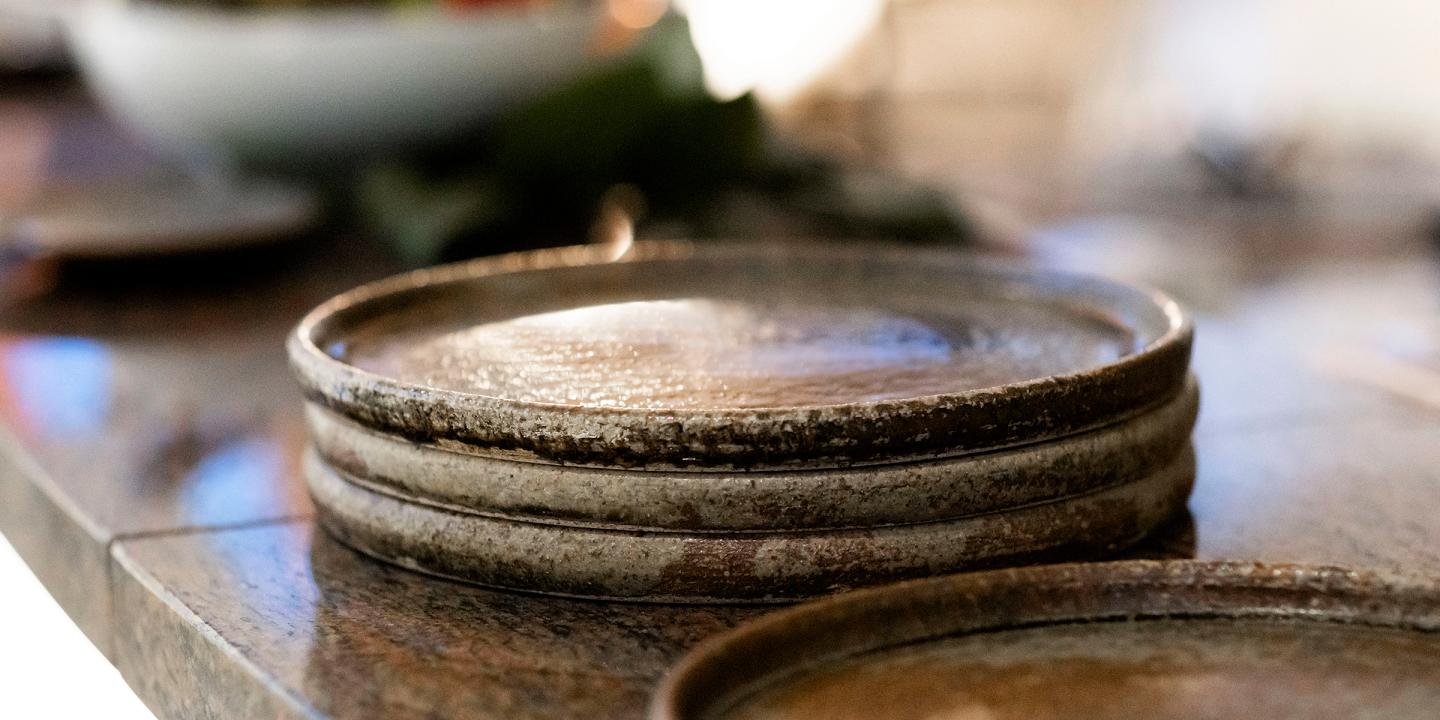
This first public dinner at the Skirball using tableware from the Common Ground installation invites you to connect with fellow diners as you explore topics such as Indigenous resilience and food traditions and enjoy a pre-colonial Indigenous plant-based menu.
This is a past program
This program took place on
Sunday, November 17, 2024
About the Program
Blending themes from the current exhibitions Common Ground and On the National Language: The Poetry of America’s Endangered Tongues, the Skirball Cultural Center is hosting our first public dinner using tableware made by artist Adam Silverman from the Common Ground installation. As its title suggests, Common Ground is a community-activated artwork that celebrates American pluralism while also fostering human connection through shared meals and other collaborative gatherings. This evening offers a chance to connect with fellow diners while celebrating Indigenous resilience, food traditions, and the deep connection between culture, language, and the land.
This unique culinary experience will feature a pre-colonial, Indigenous plant-based menu that highlights the rich diversity of Indigenous foods, increases the visibility of Indigenous histories, and promotes the use of traditional ingredients. Co-curated by food anthropologist and scholars Dr. Claudia Serrato and Dr. Scott Alves Barton, this meal will offer a unique opportunity to reflect on our relationship with the earth, striving to become better stewards of the land.
The evening will also include conversations about food, culture, health, indigeneity, and decolonization, offering valuable insights into the rich cultural practices that sustain Indigenous communities. Plus, enjoy music from teaching artist Lazaro Arvizu.
About the Menu
Participants will enjoy hors d'oeuvres such as Mesquite Roasted Pumpkin and Wild Rose Hummus, Sage-Crusted Autumn Mesquite Flatbreads, and Mini Corn Cakes; a main course including Elderberry Maple-Glazed Butternut Squash, Blue Corn Tamales, and Seared Oyster Mushrooms with Chili Morita Salsa; and save room for dessert with Elderberry-Mesquite Spice Brownies and a Prickly Pear Parfait with Roasted Pine Nuts.
Plus, enjoy a specialty cocktail Spiced Chicha Morada (Pisco or Rum), also available as a mocktail.
All menu items are plant-based and dairy-free. Please note that some dishes contain seeds and nuts. As a set menu celebrating Indigenous food traditions, substitutions are not available.
About the Foodways Scholars
Dr. Scott Alves Barton is a foodways scholar with a twenty-five–year career as an executive chef, consultant, and culinary educator. He holds a PhD in food studies from New York University and is a cultural anthropologist of African diaspora foodways at the University of Notre Dame.
His research, films, and publications focus on the intersection of secular and sacred cuisine as a marker of identity politics, feminine agency, cultural heritage, political resistance, and self-determination in Northeastern Brazil.
During his professional culinary career, Dr. Barton was named one of the top twenty-five best African/African American chefs by Ebony magazine. He is on the board of the Association for the Study of Food and Society, the Society for the Anthropology of Food and Nutrition, and the African Diaspora Religions Committee of the American Academy of Religion. He is also a member of the James Beard Foundation Cookbook Awards committee and an advisor to the Indigo Arts Alliance. Dr. Barton has been a fellow at the Instituto Sacatar, the Fundação Palmares in Brazil, the Institute for Critical Investigation at Vanderbilt University, the Tepoztlán Institute for Transnational History of the Americas, and is an ongoing fellow at Lynden Sculpture Garden in Milwaukee.
Dr. Claudia Serrato (P’urhépecha/Zacateca) is a distinguished culinary anthropologist, chef, and educator with expertise in Indigenous foods and traditions. Renowned for her advocacy of food sovereignty and contributions to preserving Indigenous foodways, Dr. Serrato integrates scholarly research with practical culinary work to activate ancestral taste memory. Holding a PhD in sociocultural anthropology from the University of Washington, she has been featured in various media outlets, including television, radio, and podcasts. Dr. Serrato co-founded “Across Our Kitchen Tables,” supporting women of color in food projects, and teaches at California State University, Pomona and Dominguez Hills. Her approach blends academic insight with hands-on practice, fostering a deep appreciation for the cultural significance of Indigenous foods. Based in Los Angeles, she elevates Indigenous culinary arts through workshops, cooking classes, and speaking engagements, making her a leading voice in Native food justice.
About Lazaro Arvizu
Lazaro Arvizu, Jr. is an artist, educator, and musician. Born and raised in the Los Angeles basin, he is knowledgeable of the landscape and history of the first people. Lazaro has worked for over twenty years facilitating creative and meaningful learning experiences to people of all ages and walks of life in many venues.
About Common Ground
Common Ground is a community-activated artwork by Los Angeles–based artist Adam Silverman that celebrates American pluralism while also fostering human connection through shared meals and collaborative installations.
With the participation of nearly one hundred people from across the country, Silverman collected clay, water, and wood ash from all fifty American states, Washington DC, and the five inhabited US Territories (Puerto Rico, the US Virgin Islands, Guam, American Samoa, and the Northern Mariana Islands). He then combined these materials to make a single, fully integrated, new material, erasing the borders of statehood and reimagining the country as a single, unified place. Silverman used this new combined material to make the glazes for Common Ground, which includes a tableware set of fifty-six plates, fifty-six bowls, fifty-six cups, as well as fifty-six ceremonial pots. The 224 objects are similar to one another in form, size, and composition, yet each is intentionally unique—just like each human being. The ceramics are intended as tools to facilitate conversation and build community.
A major new addition to the Skirball’s permanent museum collection, Common Ground will be exhibited and activated throughout 2024, during which time Silverman will also serve as the Skirball’s Artist in Residence. In collaboration with foodways scholar Dr. Scott Alves Barton and supported by local chefs as well as the Skirball’s executive chef, Sean Sheridan, the Skirball will host a series of communal gatherings during this year-long exhibition, bringing people from different communities together using the plates, bowls, cups, and ceremonial pots that comprise Common Ground.
During a time of widespread division in the United States, Common Ground hopes to bridge political, cultural, and socioeconomic differences by bringing people together around the expansive possibilities of shared human experiences.
